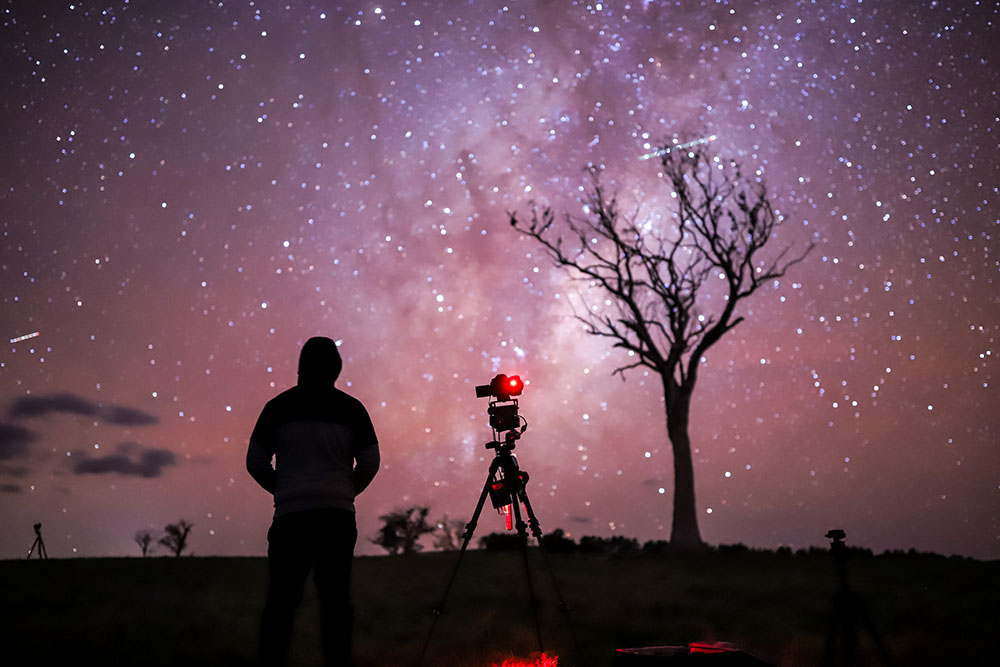You’ve purchased your DLSR camera, and are ready for the next step in your astrophotography journey. There are a multitude of brands and types of telescopes available, and you might be having some trouble making up your mind, or coming to a decision that fits both your needs and your budget. Have no fear, because this list, based on a conglomerate of reviews and skill levels, is here to help you make your final decision.
Sky-Watcher Evoguide 50 APO Refractor
While this telescope is designed explicitly for the beginner astrophotography, and functions as the training wheels you will need as you improve your skillset. It tops this list due to its highly affordable price point of only $275.00, and because it is made to be outgrown, allowing the scope to remain a useful part of your astrophotography arsenal as a guide scope mounted atop your main scope. This versatility grants the scope a consumer review score of 4.9/5, users celebrate the “excellent build quality and optics” and “adds very little additional weight” to your full rig when used as a guide scope. Until then, this scope will keep you occupied as you familiarize yourself with the hobby, since it “can even take good images of large deep sky objects.”
Orion 8″ f/3.9 Newtonian Astrograph Reflector Telescope
Boasting a 4.8/5 on Orion’s website, this telescope is priced for beginners at $499.99 but has all the capabilities you need out of a telescope built for astrophotography. The scope is fit for both planetary and deep sky photography, but simply isn’t made for the purposes of terrestrial astrophotography. Reviewers claim they “really can’t say enough about the scope,” which is “absolutely gorgeous”, and that “for the price there’s probably not a better platform for medium-focal-length astrophotography.” Having a base weight of 17.5 lbs., this telescope is highly easy to transport, and easy to set up. The f/3.9 focal ratio makes it so that “imaging dim targets suddenly becomes easier because your exposure times can be shorter.” The lowest review sitting at a 4/5, some criticisms of the telescope surround the need for a coma corrector, and some users have reported having problems with the locking mechanism in the focuser. Still, even the worst of reviews agree that “this is a nice scope with a moderate focal length,” and would “highly recommend it as a beginning or intermediate telescope with astro-imagers in mind.”
Celestron Nexstar 8SE Computerized Telescope
Probably the telescope most featured on review lists, this scope holds a 4.7/5 on Orion’s distribution site, and is moderately priced for beginners at $1,199.00. However, the higher cost brings with it the built in SkyAlign “Go To feature [which] makes beginners instant astronomers.” Some reviews claim this telescope is best suited for lunar or planetary astrophotography, but users celebrate the fact that the scope has allowed to “have seen all of the Messier’s list,… the spiral arms of the Whirlpool Galaxy (M51 under dark skies), the polar icecaps of Mars, numerous moons surrounding Saturn and Jupiter, and much more.” Weighing in at 24 lbs., the scope is easily transportable, particularly thanks to its compact and all-inclusive design. Critical reviews mention the need to purchase a battery pack, and that the gears tend toward more noise than some computerized scopes.
Sky-Watcher EvoStar 120mm APO Doublet Refractor
Reviewers say that, “If you’re on the fence about this telescope you should get down,” because “this telescope puts up views that rival refractors costing five times as much.” With a price point at $1,925.00 on Sky-Watcher’s website, and aside from the crisp, aberration free views, “what seals this deal is the extras. You get two eyepieces, a 5mm 58° and a 25mm Plossl, a right angle finder scope, 2” dielectric diagonal and a 1.25 converter for both the draw tube and diagonal.” The 120mm aperture allows fantastic decent views of deep sky objectives as well, and reviewers are eager to share their photographs as proof. As Sky-Watcher’s website lacks any customer reviews, it’s worth noting that negative reviews on Amazon, where the scope sells at nearly $600 over Sky-Watcher’s price, mostly surround delivery problems and misplaced orders, negatively impacting what is an already solid consumer rating of 4.4/5. Other criticisms include faults in the design surrounding the focuser, which “requires adjustment for heavy eyepieces” and “slides a lot with a DSLR attached, so have to use the focus lock.” The telescope weighs in at 12.5 lbs, not including a tripod mount, and a heavy duty mount is suggested to support the telescope’s weight, with legs long enough to accommodate the f/9 focal ratio.
Meade 70mm Astrograph Quadruplet APO Refractor
This scope comes highly recommended on many buyer’s guides, but is one of the least reviewed consumer scopes on the market, inflating its score to 4.9/5. With an aperture half that of SkyWatcher’s previously mentioned scope, Meade’s Astrograph Quadruplet might have you working harder for the same images of deep sky objects, but it is still more than capable of handling the task and its price of $1,199.00 makes it more affordable if cost is one of your limiting factors, and includes a M48 to T-Thread DSLR camera adapter. Reviewers say that this is the scope they “recommend to almost all beginners looking for a wide field, easy to use telescope as it also does not require any extra accessories!” That being said, critical reviews have mentioned that the short focal tube “limits the choices… for filters, adapters, and so on,” prompting the need to get creative with additional accessory attachments.

